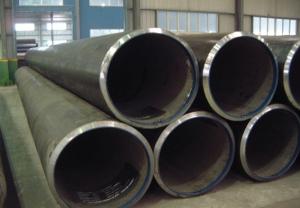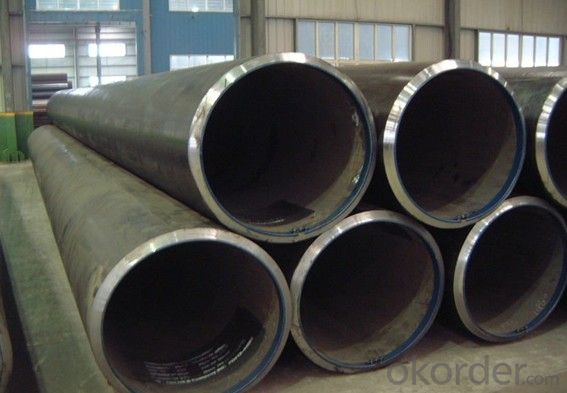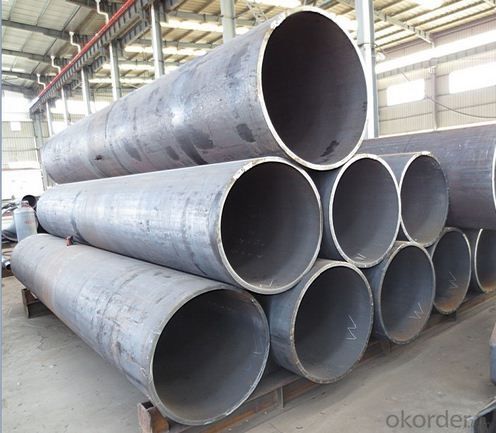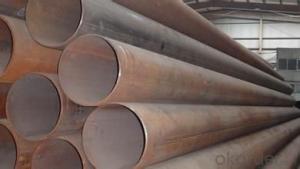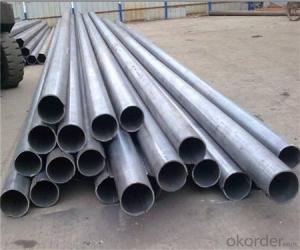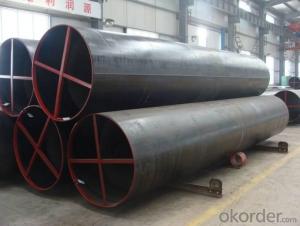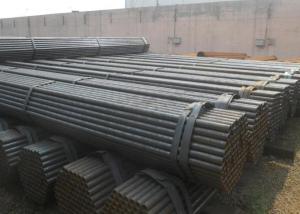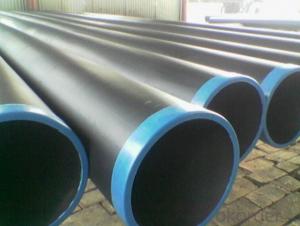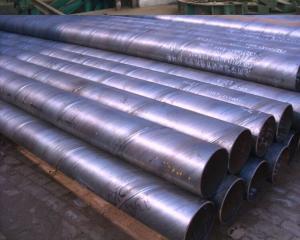Longitudinally welded steel pipe LSAW / ERW
- Loading Port:
- China Main Port
- Payment Terms:
- TT or LC
- Min Order Qty:
- 25MT m.t.
- Supply Capability:
- 9000MT m.t./month
OKorder Service Pledge
OKorder Financial Service
You Might Also Like
Product Description:
1、Structure of API5L CARBON STEEL Longitudinally welded steel pipe LSAW Description:
2、Main Features of the API5L CARBON STEEL Longitudinally welded steel pipe LSAW
• High manufacturing accuracy
• High strength
• Small inertia resistance
• Strong heat dissipation ability
• Good visual effect
• Reasonable price
LSAW PIPE is formed by drawing a solid billet over a piercing rod to create the hollow shell. As the manufacturing process does not include any welding, seamless pipes are perceived to be stronger and more reliable. Historically seamless pipe was regarded as withstanding pressure better than other types, and was often more easily available than welded pipe.
3、 API5L CARBON STEEL Longitudinally welded steel pipe LSAW Images:
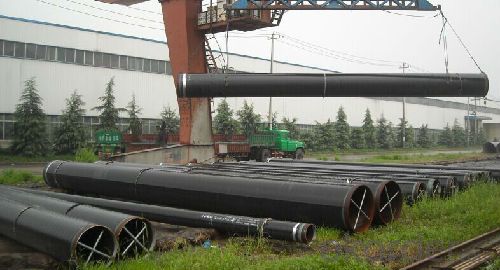
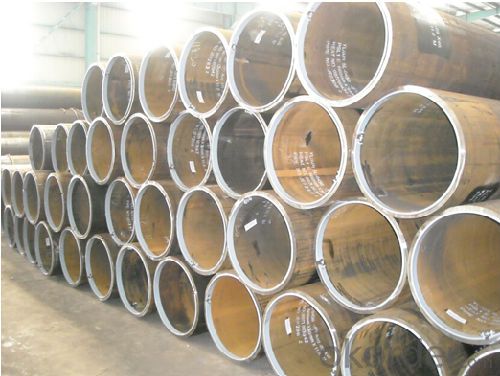
- Q: Can steel pipes be used for gas distribution?
- Yes, steel pipes can be used for gas distribution. Steel pipes are commonly used for transporting natural gas and other gases due to their high strength, durability, and resistance to corrosion. They can withstand high pressure and are suitable for long-distance gas distribution networks. However, it is important to ensure proper materials and installation techniques are used to prevent any potential safety hazards.
- Q: What is the purpose of pipe flanges in steel pipes?
- The purpose of pipe flanges in steel pipes is to provide a secure and leak-proof connection between two pipes or fittings. Flanges act as a connection point, allowing easy assembly and disassembly of pipes while ensuring a tight seal to prevent any leakage or loss of fluid or gas.
- Q: What are the common materials used for pipe fittings in steel pipes?
- The common materials used for pipe fittings in steel pipes include carbon steel, stainless steel, and alloy steel. Carbon steel pipe fittings are widely used due to their affordability, strength, and durability. They are suitable for various applications, including oil and gas, petrochemical, and water distribution systems. Stainless steel pipe fittings are highly resistant to corrosion and are commonly used in industries that require a high level of hygiene, such as food and beverage and pharmaceutical industries. Alloy steel pipe fittings are composed of multiple elements, such as chromium, nickel, and molybdenum, to enhance their strength and resistance to corrosion. These fittings are often used in high-pressure and high-temperature applications, such as power plants and chemical plants. Overall, the choice of material for pipe fittings in steel pipes depends on the specific requirements of the application and the environment in which they will be used.
- Q: How are steel pipes used in the manufacturing of oil refineries?
- Steel pipes are essential in the manufacturing of oil refineries as they are used for various purposes such as transporting crude oil, petroleum products, and other fluids throughout the facility. These pipes are used for the construction of pipelines, storage tanks, and various process equipment within the refinery. They provide a reliable and durable means of conveying and distributing fluids necessary for the refining process, ensuring efficient operations and the safe transportation of oil and its byproducts.
- Q: How are steel pipes used in the construction of water supply systems?
- Steel pipes are commonly used in the construction of water supply systems due to their durability and strength. They are often used to transport water from the source to treatment plants, as well as for distribution to homes and businesses. Steel pipes are resistant to corrosion, which ensures the quality of the water and the longevity of the system. Additionally, their high pressure-bearing capacity makes them suitable for water supply networks that require efficient and reliable transportation of water.
- Q: How are steel pipes used in the construction of oil refineries?
- Steel pipes are extensively used in the construction of oil refineries as they are strong, durable, and resistant to corrosion. These pipes are used for various purposes such as transporting crude oil, refined products, and various chemicals within the refinery. They are also utilized in the construction of the refinery's infrastructure, including the fabrication of storage tanks, process equipment, and piping systems that connect different units and sections of the facility. Overall, steel pipes play a crucial role in maintaining the integrity and efficiency of oil refineries.
- Q: Seamless steel pipe 8162 and 8163 what is the difference?
- GB 8162 is the structure of the tube, there is no need for flaw detection, the use of mechanical processing, stents;
- Q: What is the thickness of steel pipes?
- The thickness of steel pipes can vary depending on the specific application and type of pipe being used. Generally, steel pipes come in a range of thicknesses, which are measured in terms of their schedule or wall thickness. The most common schedule for steel pipes is Schedule 40, which has a standard wall thickness. However, thicker pipes with higher schedules, such as Schedule 80 or Schedule 160, are also available for applications requiring greater strength or pressure resistance. Additionally, the thickness of steel pipes can also be customized based on specific project requirements.
- Q: How seamless steel tube is formed?
- Hot drawing or cold drawing. The so-called cold is the billet from the thick wall tube is not heated, oil lubrication, with a steel sleeve inside, gradually elongated. Hot drawing is to make the billet tube red, do such work, generally thick wall applicable.
- Q: What are the different types of supports used for steel pipes?
- The different types of supports used for steel pipes include pipe clamps, pipe hangers, pipe saddles, and pipe rollers. These supports are designed to securely hold and suspend the steel pipes in place, ensuring proper alignment and preventing sagging or movement.
Send your message to us
Longitudinally welded steel pipe LSAW / ERW
- Loading Port:
- China Main Port
- Payment Terms:
- TT or LC
- Min Order Qty:
- 25MT m.t.
- Supply Capability:
- 9000MT m.t./month
OKorder Service Pledge
OKorder Financial Service
Similar products
Hot products
Hot Searches
Related keywords
